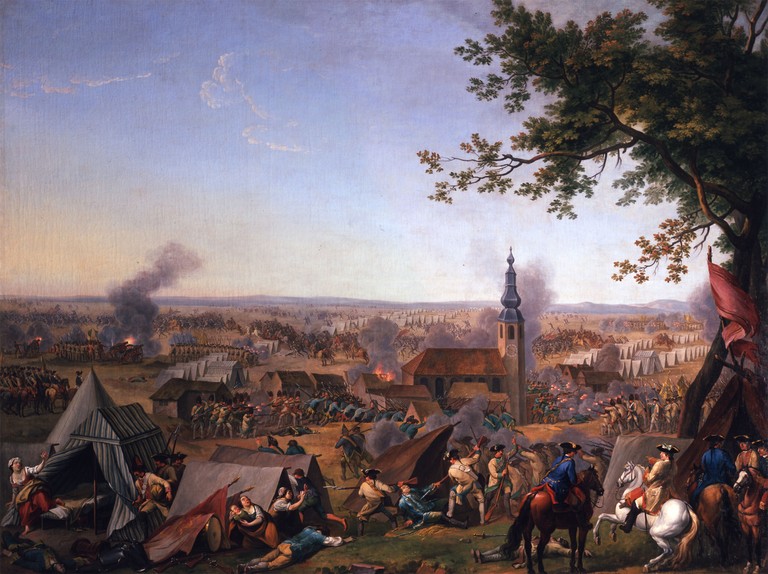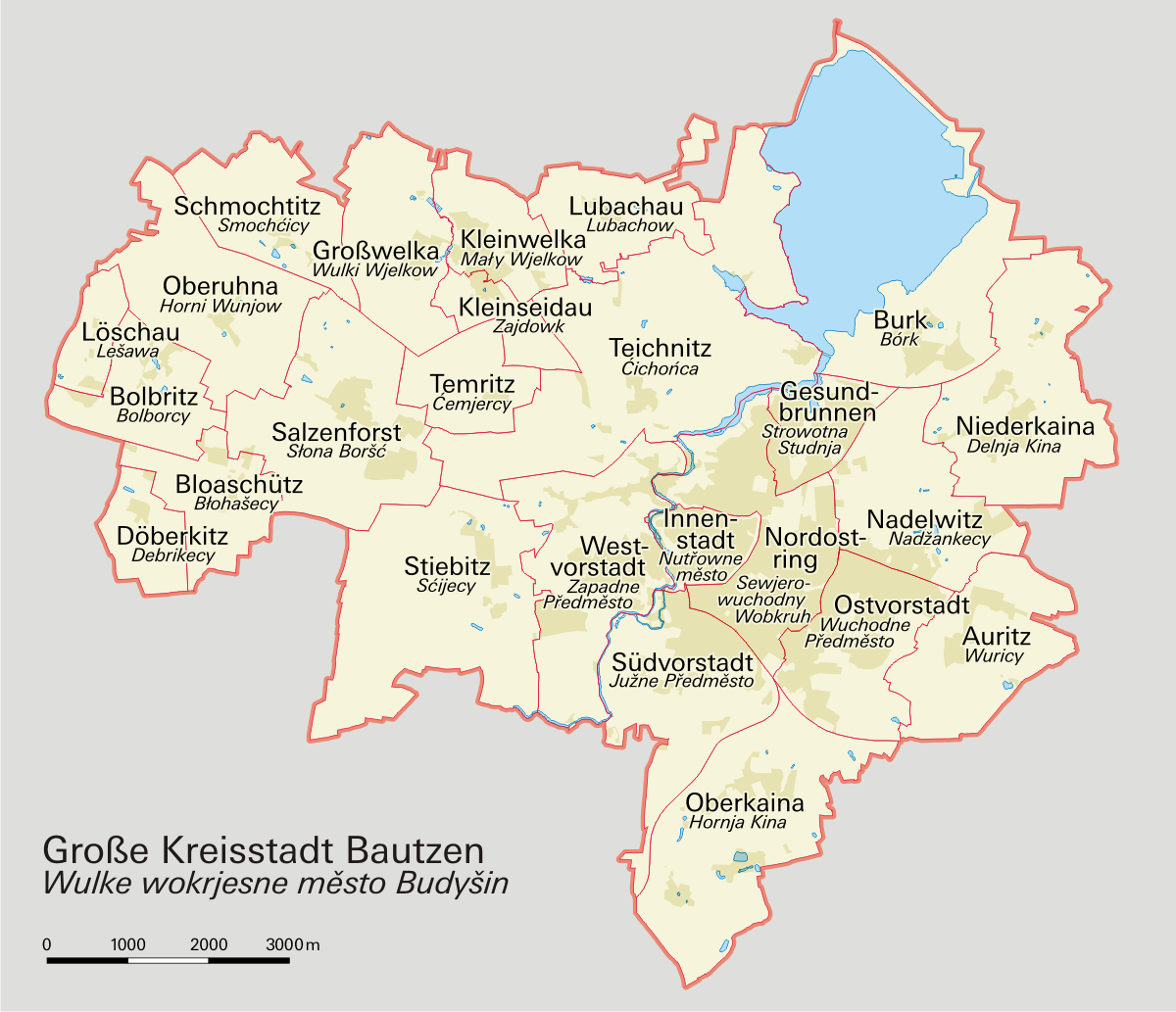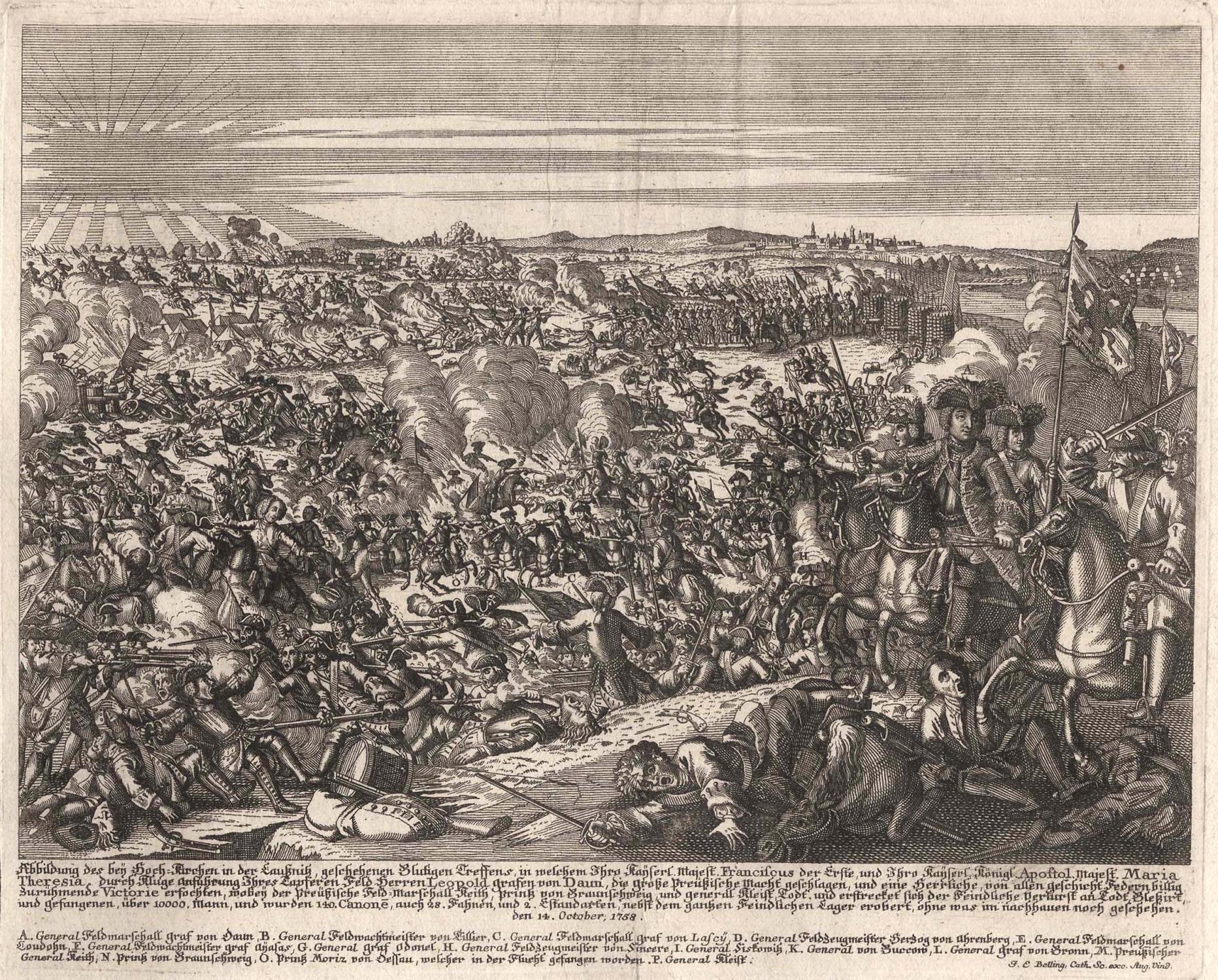|
Siegmund Moritz William Von Langen
Siegmund Moritz William von Langen, also called Simon Moritz, ( 1706 or 1708, Westphalia–21 October 1758, Bautzen, Silesia), was a Prussian major of the who died of injuries received in the Hochkirch churchyard during the Battle of Hochkirch, in the Seven Years' War. His actions at Hochkirch delayed the Austrian forces sufficiently for Frederick the Great to organize a retreat. This saved the Prussian army. Military career He entered the Prussian military as an 18-year-old, and 1736 was promoted to second lieutenant in the Infantry Regiment Krocher (No. 18). In 1741, he was in the regiment Markgraf Heinrich No. 42, in which he entered into the Seven Years' War. He was wounded at the Battle of Leuthen, but recovered from these wounds. Promoted to major, he served at the Siege of Olmütz.Bernhard von PotenLangen, Siegmund Moriz Wilhelm von ''Allgemeine Deutsche Biographie,'' herausgegeben von der Historischen Kommission bei der Bayerischen Akademie der Wissenschaften, Ban ... [...More Info...] [...Related Items...] OR: [Wikipedia] [Google] [Baidu] |
Hochkirch
Hochkirch (German) or Bukecy (Upper Sorbian) is a municipality in the district of Bautzen, in Saxony, Germany. It is known for the 1758 Battle of Hochkirch, part of the Seven Years' War. The municipality (except Breitendorf) is part of the recognized Sorbian settlement area in Saxony. Upper Sorbian has an official status next to German, all villages bear names in both languages. Geography Hochkirch is located in the historic Upper Lusatia region, about east of the administrative capital Bautzen and northwest of Löbau. Situated within the Lusatian Highlands, it belongs to the settlement area of the Sorbs. History The village of ''Bukovici'' (possibly derived from Upper Sorbian ''buk'': " beech") was first mentioned in a 1222 deed issued by Bishop Bruno II of Meissen; the present German name first appeared in 1368. By the 1635 Peace of Prague, the area passed to the Electorate of Saxony. During the Seven Years' War on 14 October 1758, the Habsburg (Austrian) Imperial Army ... [...More Info...] [...Related Items...] OR: [Wikipedia] [Google] [Baidu] |
Prussia
Prussia, , Old Prussian: ''Prūsa'' or ''Prūsija'' was a German state on the southeast coast of the Baltic Sea. It formed the German Empire under Prussian rule when it united the German states in 1871. It was ''de facto'' dissolved by an emergency decree transferring powers of the Prussian government to German Chancellor Franz von Papen in 1932 and ''de jure'' by an Allied decree in 1947. For centuries, the House of Hohenzollern ruled Prussia, expanding its size with the Prussian Army. Prussia, with its capital at Königsberg and then, when it became the Kingdom of Prussia in 1701, Berlin, decisively shaped the history of Germany. In 1871, Prussian Minister-President Otto von Bismarck united most German principalities into the German Empire under his leadership, although this was considered to be a "Lesser Germany" because Austria and Switzerland were not included. In November 1918, the monarchies were abolished and the nobility lost its political power during the Ger ... [...More Info...] [...Related Items...] OR: [Wikipedia] [Google] [Baidu] |
Prussian Army
The Royal Prussian Army (1701–1919, german: Königlich Preußische Armee) served as the army of the Kingdom of Prussia. It became vital to the development of Brandenburg-Prussia as a European power. The Prussian Army had its roots in the core mercenary forces of Brandenburg during the Thirty Years' War of 1618–1648. Elector Frederick William developed it into a viable standing army, while King Frederick William I of Prussia dramatically increased its size and improved its doctrines. King Frederick the Great, a formidable battle commander, led the disciplined Prussian troops to victory during the 18th-century Silesian Wars and greatly increased the prestige of the Kingdom of Prussia. The army had become outdated by the beginning of the Napoleonic Wars, and France defeated Prussia in the War of the Fourth Coalition in 1806. However, under the leadership of Gerhard von Scharnhorst, Prussian reformers began modernizing the Prussian Army, which contributed greatly to the defea ... [...More Info...] [...Related Items...] OR: [Wikipedia] [Google] [Baidu] |
War Of Austrian Succession
War is an intense armed conflict between states, governments, societies, or paramilitary groups such as mercenaries, insurgents, and militias. It is generally characterized by extreme violence, destruction, and mortality, using regular or irregular military forces. Warfare refers to the common activities and characteristics of types of war, or of wars in general. Total war is warfare that is not restricted to purely legitimate military targets, and can result in massive civilian or other non-combatant suffering and casualties. While some war studies scholars consider war a universal and ancestral aspect of human nature, others argue it is a result of specific socio-cultural, economic or ecological circumstances. Etymology The English word ''war'' derives from the 11th-century Old English words ''wyrre'' and ''werre'', from Old French ''werre'' (also ''guerre'' as in modern French), in turn from the Frankish *''werra'', ultimately deriving from the Proto-Germanic *''we ... [...More Info...] [...Related Items...] OR: [Wikipedia] [Google] [Baidu] |
Seven Years' War
The Seven Years' War (1756–1763) was a global conflict that involved most of the European Great Powers, and was fought primarily in Europe, the Americas, and Asia-Pacific. Other concurrent conflicts include the French and Indian War (1754–1763), the Carnatic Wars and the Anglo-Spanish War (1762–1763). The opposing alliances were led by Great Britain and France respectively, both seeking to establish global pre-eminence at the expense of the other. Along with Spain, France fought Britain both in Europe and overseas with land-based armies and naval forces, while Britain's ally Prussia sought territorial expansion in Europe and consolidation of its power. Long-standing colonial rivalries pitting Britain against France and Spain in North America and the West Indies were fought on a grand scale with consequential results. Prussia sought greater influence in the German states, while Austria wanted to regain Silesia, captured by Prussia in the previous war, and to contain Pruss ... [...More Info...] [...Related Items...] OR: [Wikipedia] [Google] [Baidu] |
Equestrian Statue Of Frederick The Great
The Equestrian statue of Frederick the Great on Unter den Linden avenue in Berlin's Mitte district commemorates King Frederick II. of Prussia. Created from 1839 to 1851 by Christian Daniel Rauch, it is a masterpiece of the Berlin school of sculpture, marking the transition from neoclassicism to realism. The bronze statue shows "The Old Fritz" dressed in military uniform, ermine coat and tricorne hat on horseback above the leading generals, statesmen, artists and scientist of his time. Walled in during World War II, it was disassembled by East Germany in 1950, reassembled in Sanssouci Park in 1963, and returned to its original location in 1980. History Prussian King Frederick William III commissioned the monument from sculptor Christian Daniel Rauch in 1839. It was cast beginning in 1845 by Karl Ludwig Friebel, whom Rauch brought from Lauchhammer for the purpose; changes to the figures on the base extended work to six years, and the monument was unveiled on 31 May 1851. It is o ... [...More Info...] [...Related Items...] OR: [Wikipedia] [Google] [Baidu] |
Bautzen
Bautzen () or Budyšin () is a hill-top town in eastern Saxony, Germany, and the administrative centre of the district of Bautzen. It is located on the Spree river. In 2018 the town's population was 39,087. Until 1868, its German name was ''Budissin''. In 1945 the Battle of Bautzen was Hitler’s last victory against the Soviet Union during the Battle of Berlin . Bautzen is often regarded as the unofficial, but historical capital of Upper Lusatia. The town is also the most important cultural centre of the Sorbian minority, which constitutes about 10 percent of Bautzen's population. Asteroid '' 11580 Bautzen'' is named in honour of the city. Names Like other cities and places in Lusatia, Bautzen has several different names across languages. Its German name was also officially changed in 1868. As well as ''Bautzen'' (German) and ''Budyšin'' (Upper Sorbian), the town has had the following names: * German: ''Budissin'' (variants used from c. 11th century onwards; Saxon governme ... [...More Info...] [...Related Items...] OR: [Wikipedia] [Google] [Baidu] |
Battle Of Hochkirch
The Battle of Hochkirch took place on 14 October 1758, during the Third Silesian War (part of the Seven Years' War). After several weeks of maneuvering for position, an Austrian army of 80,000 commanded by Lieutenant Field Marshal Leopold Josef Graf Daun surprised the Prussian army of 30,000–36,000 commanded by Frederick the Great. The Austrian army overwhelmed the Prussians and forced a general retreat. The battle took place in and around the village of Hochkirch, east of Bautzen, Saxony. Historians generally consider the battle as among Frederick's greatest blunders. Contrary to the advice of his subordinates, he refused to believe that the typically cautious Austrian commander Leopold von Daun would bring his troops into battle. The Austrian force ambushed his army in a pre-dawn attack. Over 30% of Frederick's army was defeated; five generals were killed and he lost his artillery park and a vast quantity of supplies. Although Daun had scored a complete surprise, his atte ... [...More Info...] [...Related Items...] OR: [Wikipedia] [Google] [Baidu] |
Frederick The Great
Frederick II (german: Friedrich II.; 24 January 171217 August 1786) was King in Prussia from 1740 until 1772, and King of Prussia from 1772 until his death in 1786. His most significant accomplishments include his military successes in the Silesian wars, his re-organisation of the Prussian Army, the First Partition of Poland, and his patronage of the arts and the Enlightenment. Frederick was the last Hohenzollern monarch titled King in Prussia, declaring himself King of Prussia after annexing Polish Prussia from the Polish–Lithuanian Commonwealth in 1772. Prussia greatly increased its territories and became a major military power in Europe under his rule. He became known as Frederick the Great (german: links=no, Friedrich der Große) and was nicknamed "Old Fritz" (german: links=no, "Der Alte Fritz"). In his youth, Frederick was more interested in music and philosophy than in the art of war, which led to clashes with his authoritarian father, Frederick William I of Prussia. ... [...More Info...] [...Related Items...] OR: [Wikipedia] [Google] [Baidu] |
Battle Of Leuthen
The Battle of Leuthen was fought on 5 December 1757 and involved Frederick the Great's Prussian Army using maneuver warfare and terrain to rout a larger Austrian force completely, which was commanded by Prince Charles of Lorraine and Count Leopold Joseph von Daun. The victory ensured Prussian control of Silesia during the Third Silesian War, which was part of the Seven Years' War. The battle was fought in the town of Leuthen (now Lutynia, Poland), 10 km (6 mi) northwest of Breslau, (now Wrocław, Poland), in Prussian (formerly Austrian) Silesia. By exploiting the training of his troops and his superior knowledge of the terrain, Frederick created a diversion at one end of the battlefield and moved most of his smaller army behind a series of low hillocks. The surprise attack in oblique order on the unsuspecting Austrian flank baffled Prince Charles, who took several hours to realize that the main action was to his left, not his right. Within seven hours, the Prus ... [...More Info...] [...Related Items...] OR: [Wikipedia] [Google] [Baidu] |
Siege Of Olomouc
{{Austria-battle-stub ...
The siege of Olomouc took place in 1758 when a Prussian army led by Frederick the Great besieged the Austrian city of Olmütz (now Olomouc, Czech Republic) during the Prussian invasion of Moravia in the Third Silesian War (Seven Years' War). The attempt stalled as the besiegers faced stronger resistance than Frederick had expected. With a lack of supplies and the approach of an Austrian relief force following the Battle of Domstadtl, Frederick abandoned the siege and withdrew from Moravia. Bibliography * Szabo, Franz. ''The Seven Years War in Europe, 1756–1763''. Pearson, 2008. Olomouc Olomouc Olomouc Olomouc Olomouc 1758 in Austria Olomouc Olomouc Olomouc Olomouc Olomouc (, , ; german: Olmütz; pl, Ołomuniec ; la, Olomucium or ''Iuliomontium'') is a city in the Czech Republic. It has about 99,000 inhabitants, and its larger urban zone has a population of about 384,000 inhabitants (2019). Located on th ... [...More Info...] [...Related Items...] OR: [Wikipedia] [Google] [Baidu] |
Karl O'Donnell
Karl O'Donnell, Count of Tyrconnel (1715–1771) held important commands in the Austrian army during the Seven Years' War. Between 1768 and 1770, he was governor of Transylvania. Biography O'Donnell held important commands during the Third Silesian War between Prussia and Austria, during the Seven Years' War, up to the rank of general. He distinguished himself in the Battles of Lobositz (1756), Prague (1757) and Kolin (1757). He was wounded and taken prisoner in the Battle of Leuthen. Released in 1758, he participated in the Battle of Hochkirch and Battle of Maxen, amongst others. His greatest military performance was in the Battle of Torgau (1760), where he repelled an attack from the numerically superior enemy cavalry and took over the command for the wounded field marshal Graf Daun, which he held until the winter of 1760. He was awarded the Grand Cross of the Military Order of Maria Theresa for his achievements in this battle. Family O'Donnell was a descendant of the Irish ... [...More Info...] [...Related Items...] OR: [Wikipedia] [Google] [Baidu] |





